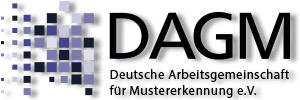Since 2015, the German Association for Pattern Recognition (DAGM e.V.) has granted the DAGM MVTec Dissertation Award. The Dissertation Award honors an outstanding dissertation successfully completed in the preceding year in the fields of pattern recognition, image processing, machine vision, and machine learning. An association with the DAGM is desirable. The Dissertation Award is donated by MVTec Software GmbH and consists of a financial award of 2500 euros.
Award Winner of the DAGM MVTec Dissertation Award 2023
In 2023, the DAGM MVTec Dissertation Award was granted to David Stutz for his outstanding dissertation on
Understanding and Improving Robustness and Uncertainty Estimation in Deep Learning
Award Winner of the DAGM MVTec Dissertation Award 2022
In 2022, the DAGM MVTec Dissertation Award was granted to Marc Habermann for his outstanding dissertation on
Real-time Human Performance Capture and Synthesis
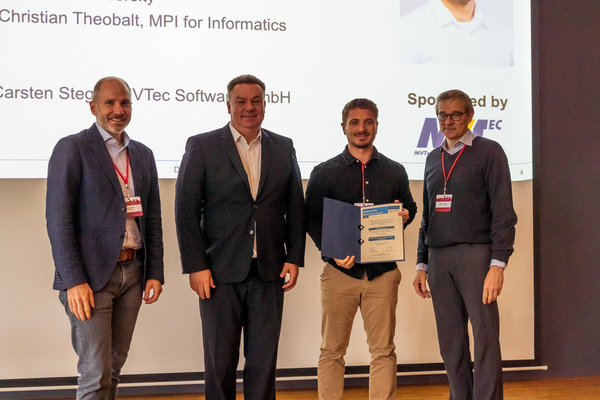
Pictured left to right: Prof. Dr. Stefan Roth (Vice Chairman of the German Association for Pattern Recognition DAGM) , Prof. Dr. Carsten Steger (MVTec Software GmbH, TU Munich), Dr. Marc Habermann, Prof. Dr. Bernt Schiele (Chairman of the German Association for Pattern Recognition DAGM)
Dr. Habermann received his B.Sc. in computer science in 2016 and his M.Sc. in computer science in 2017, both from Saarland University. He then worked as a researcher at the Max Planck Institute for Informatics, Saarbrücken, from 2017 until 2021 under the supervision of Prof. Christian Theobalt and received his Ph.D. degree from Saarland University in 2021. He currently is the research group leader of the Graphics and Vision for Digital Humans group in the Visual Computing and Artificial Intelligence Department at the Max Planck Institute for Informatics in Saarbrücken.
In his thesis, entitled "Real-time Human Performance Capture and Synthesis,” Marc Habermann has introduced numerous highly original, highly impactful, and far-reaching contributions to the topic of 3D and 4D human reconstruction and synthesis from video. The presented new methods to combine model-based and learning-based concepts in end-to-end-trainable combined architectures and the new methods to train them purely on 2D image data rather than explicit 3D data as supervision are groundbreaking and highly relevant beyond the core topic of virtual humans.
Award Winner of the DAGM MVTec Dissertation Award 2021
In 2021, the DAGM MVTec Dissertation Award was granted to Lars Morten Mescheder for his outstanding dissertation on
Stability and Expressiveness of Deep Generative Models
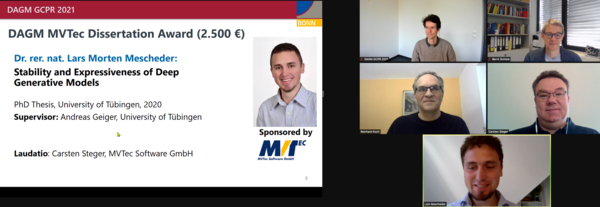
Pictured top to bottom: Prof. Dr. Jürgen Gall, Prof. Dr. Bernt Schiele (Chairman of the German Association for Pattern Recognition DAGM), Prof. Dr. Reinhard Koch, Prof. Dr. Carsten Steger (MVTec Software GmbH, TU Munich), Dr. Lars Mescheder
Dr. Lars Mescheder received his B.Sc. in Mathematics in 2013 and his M.Sc. in Mathematics in 2016, both from the Braunschweig University of Technology. He then worked as a researcher at the Max Planck Institute for Intelligent Systems, Tübingen, from 2016 until 2019 under the supervision of Prof. Andreas Geiger and received his PhD degree from the University of Tübingen in 2019. He currently is an applied scientist at the Amazon Development Center, Tübingen.
In his thesis, entitled “Stability and Expressiveness of Deep Generative Models", Lars Mescheder has developed new deep insights into the training dynamics of GANs as well as novel output representations for 3D deep learning. Dr. Mescheder’s dissertation is unique in that it is both mathematically deep and rigorous and practically relevant. After only a few years, his work has already left a lasting impact on the field of machine learning and computer vision and has contributed significantly to the development of the next generation of generative models.
Award Winner of the DAGM MVTec Dissertation Award 2020
In 2020, the DAGM MVTec Dissertation Award was granted to Vladislav Golyanik for his outstanding dissertation on
Robust Methods for Dense Monocular Non-Rigid 3D Reconstruction and Alignment of Point Clouds
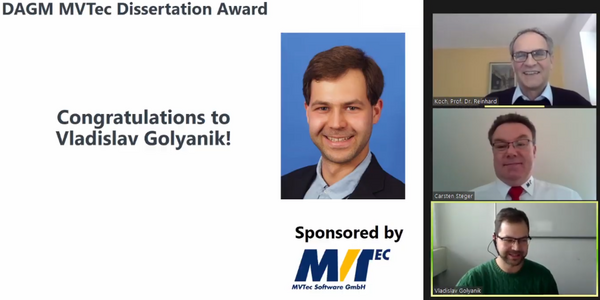
top to bottom: Prof. Dr. Reinhard Koch (Chairman of the German Association for Pattern Recognition DAGM e.V.), Prof. Dr. Carsten Steger (MVTec Software GmbH, TU Munich), Dr. Vladislav Golyanik
Dr. Vladislav Golyanik received his Diploma in Computer Science in 2010 from the Moscow Aviation Institute at the National Research University, Moscow, and his M.Sc. in Computer Science in 2013 from Ulm University. From 2013 to 2018 he worked as a researcher at the German Research Center for Artificial Intelligence (DFKI), Kaiserslautern, in the Augmented Vision Department under the supervision of Prof. Didier Stricker, and he received his PhD degree from the Technical University of Kaiserslautern in 2019. He currently is a researcher at the Max Planck Institute (MPI) for Informatics, Saarbrücken, in the Graphics, Vision, and Video group.
In his thesis, entitled “Robust Methods for Dense Monocular Non-Rigid 3D Reconstruction and Alignment of Point Clouds,” Vladislav Golyanik has presented numerous contributions to the fields of monocular 3D reconstruction of non-rigid scenes and point set registration. The proposed methods are original, mathematically sound and always have been evaluated very carefully. In addition to the theoretical contributions, Dr. Golyanik has proposed algorithms for efficient implementations of the methods, which have been tested in the context of real applications. The thesis is very well written, clearly structured, and represents an excellent reference work for researchers working in this field.
Award Winner of the DAGM MVTec Dissertation Award 2019
In 2019, the DAGM MVTec Dissertation Award was granted to Umar Iqbal for his outstanding dissertation on
Articulated Human Pose Estimation in Unconstrained Images and Videos
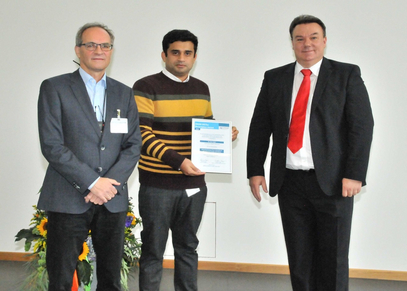
Pictured left to right: Prof. Dr. Reinhard Koch (Chairman of the German Association for Pattern Recognition DAGM e.V.), Dr. Umar Iqbal, Prof. Dr. Carsten Steger (MVTec Software GmbH, TU Munich)
Dr. Umar Iqbal received his B.Sc. in Computer Engineering in 2010 from COMSATS Institute of Information Technology (CIIT), Pakistan, and his M.Sc. in Information Technology in 2013 from Tampere University of Technology, Finland. He then worked as a researcher at the University of Bonn from 2014 until 2018 under the supervision of Prof. Jürgen Gall and received his PhD degree from the University of Bonn in 2018. He currently is a research scientist at NVIDIA Research, USA.
In his thesis, entitled “Articulated Human Pose Estimation in Unconstrained Images and Videos,” Umar Iqbal has substantially advanced the field of 2D and 3D articulated pose estimation from RGB images or videos. The thesis has not only shown how the 3D hand pose can be efficiently and accurately estimated from a single image. It also has unified two approaches that were separate so far, human pose estimation and multi-person tracking, in a single framework. In addition to these outstanding achievements, the PoseTrack benchmark, proposed in the thesis, is an important contribution to the computer vision and pattern recognition community.
Award Winners of the DAGM MVTec Dissertation Award 2018
In 2018, the DAGM MVTec Dissertation Award was granted to Dr. Siyu Tang and Dr. Mateusz Malinowski.
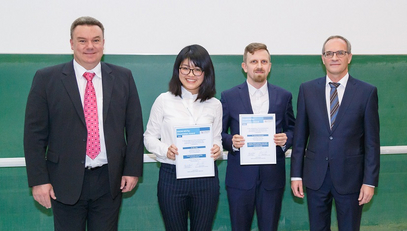
Pictured left to right: Prof. Dr. Carsten Steger (MVTec Software GmbH, TU Munich), Dr. Siyu Tang, Dr. Mateusz Malinowski, Prof. Dr. Reinhard Koch (Chairman of the German Association for Pattern Recognition DAGM)
The DAGM MVTec Dissertation Award was granted to Dr. Siyu Tang for her outstanding dissertation on
People Detection and Tracking in Crowded Scenes
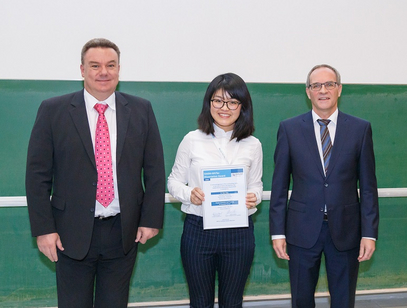
Dr. Siyu Tang graduated in media informatics at RWTH Aachen University and received her Master’s degree in 2011. She then worked as a researcher at the Max Planck Institute for Informatics in Saarbrücken from 2011 until 2017 under the supervision of Prof. Bernt Schiele and received her PhD degree from Saarland University in 2017. She currently is a Research Group Leader at the Max Planck Institute for Intelligent Systems in Tübingen. In her thesis, entitled “People Detection and Tracking in Crowded Scenes,” Siyu Tang made significant contributions in the area of multi-person tracking and detection. She proposed novel and rigorous mathematical formulations based on minimum cost multicut models that perform well for challenging real-word visual scenes and thus have defined the state of the art in this area, winning the Multi-Object Tracking Challenge at ECCV 2016 and CVPR 2017.
The DAGM MVTec Dissertation Award was granted to Dr. Mateusz Malinowski for his outstanding dissertation on
Towards Holistic Machines: From Visual Recognition To Question Answering About Real-World Images
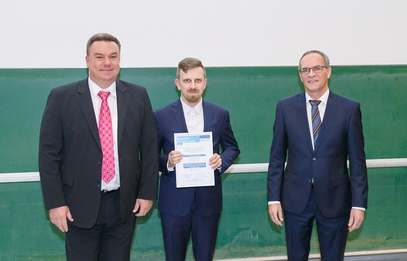
Dr. Mateusz Malinowski graduated in computer science at Saarland University and received his Master’s degree in 2011. He then worked as a researcher at the Max Planck Institute for Informatics in Saarbrücken from 2011 until 2016 under the supervision of Dr. Mario Fritz and received his PhD degree from Saarland University in 2017. He currently is a Research Scientist at Google DeepMind. In his thesis, entitled “Towards Holistic Machines: From Visual Recognition To Question Answering About Real-World Images,” Mateusz Malinowski pioneered the work on visual question answering. He created the foundations of this task, built the first dataset with natural questions about real-world images, proposed evaluation methods, and developed two first approaches for answering questions about images: one connects with more traditional fields of AI, the other one builds upon the recent progress on deep learning. The task and methods have become very influential in the computer vision community, which even led to separate tracks for visual question answering at top-tier conferences such as NIPS and CVPR.
Award Winner of the DAGM MVTec Dissertation Award 2017
In 2017, the DAGM MVTec Dissertation Award was granted to Alexander Freytag for his outstanding dissertation on
Lifelong Learning for Visual Recognition Systems
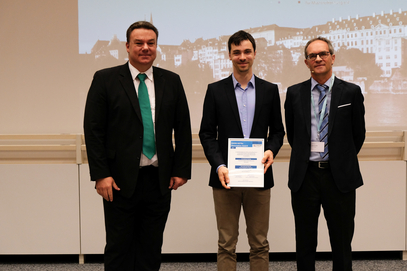
Pictured left to right: Prof. Dr. Carsten Steger (MVTec Software GmbH, TU Munich), Dr. Alexander Freytag, Prof. Dr. Reinhard Koch (Chairman of the German Association for Pattern Recognition DAGM)
Dr. Alexander Freytag graduated in computer science at the University of Jena and received his Diploma degree in 2011. He then worked as a researcher at the University of Jena from 2011 until 2016 under the supervision of Prof. Joachim Denzler and received his PhD degree from the University of Jena in 2016. He currently is a Research Scientist for Machine Learning and Computer Vision at Carl-Zeiss AG, Corporate Research and Technology.
In his thesis entitled “Lifelong Learning for Visual Recognition Systems”, Alexander Freytag tackled the problem of lifelong learning in a very general manner, including not just the efficient incremental learning of classifiers over time, but also the detection of unknown objects, which is called novelty detection or open set learning. His main contribution arises from the EMOC (Expected Model Output Changes) method, an original and effective optimization criterion for active learning. He was able to close the loop in lifelong learning for the first time and demonstrated the effectiveness of his approach in several, diverse applications. His thesis also received an award for the best dissertation in 2016 from the Faculty of Mathematics and Computer Science of the University of Jena.
Award Winner of the DAGM MVTec Dissertation Award 2016
In 2016, the DAGM MVTec Dissertation Award was granted to Dr. Christoph Vogel for his outstanding dissertation on
Robust and accurate 3D motion estimation under adverse conditions
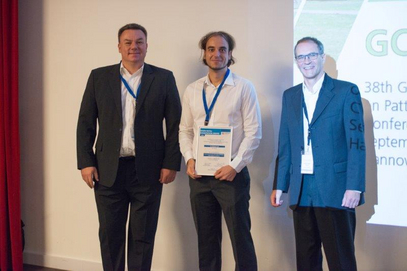
Pictured left to right: Prof. Dr. Carsten Steger (MVTec Software GmbH, TU Munich), Dr. Christoph Vogel, Prof. Dr. Reinhard Koch (Chairman of the German Association for Pattern Recognition DAGM)
Award Winner of the DAGM MVTec Dissertation Award 2015
In 2015, the DAGM MVTec Dissertation Award was granted to Dr. Marcus Rohrbach for his outstanding dissertation on
Linguistic Knowledge for Visual Recognition and Natural Language Descriptions of Visual Content
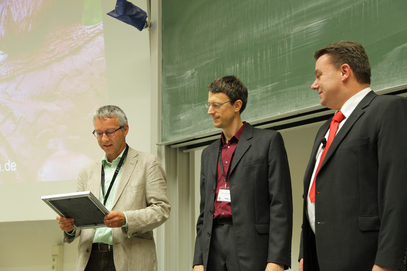
Pictured left to right: Prof. Joachim M. Buhmann (Chairman of the German Association for Pattern Recognition DAGM), Dr. Marcus Rohrbach, Prof. Dr. Carsten Steger (MVTec Software GmbH, TU Munich)
